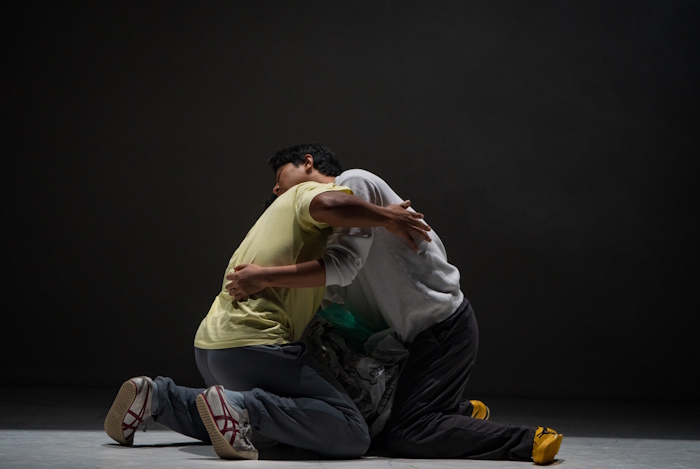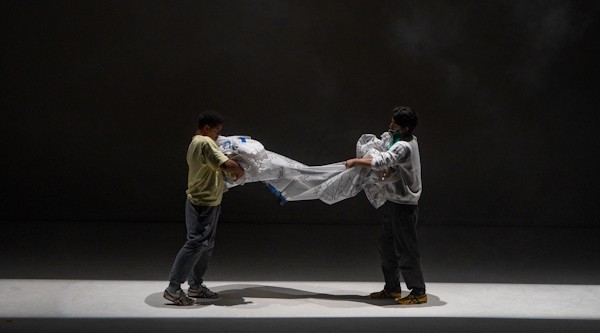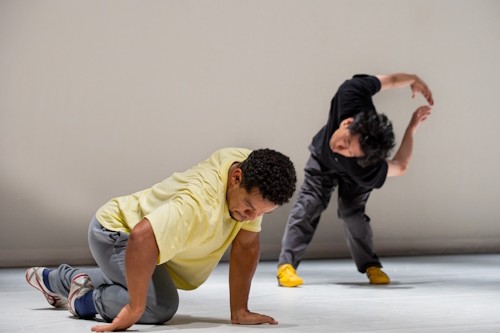The Coronet Theatre, London
October 24, 2025
Deciphers by Jean Abreu and Naishi Wang purports to be a “powerful and revelatory duet about communication, connection, and identity.” Unfortunately, much of that remains resolutely hidden over the work’s sixty minutes. That’s a shame, because it’s full of excellent physicality and the duo, each in their own way tremendous dancers, clearly have a lot to say.
The two choreographers share similar backgrounds in that both moved from their home country to one with different culture, language and traditions: Abreu from Brazil to the UK, Wang from China to Canada. By necessity, both had to adapt, and both experienced their personal movement styles evolving in their new homes.
As the audience enters, Wang and Abreu are on the floor, drawing and writing busily on a long strip of paper that’s already covered with what looks like pages from magazines, newspaper clippings, drawn symbols and other markings. Often, they appear to be drawing the audience, but only one image was obviously that. One word stood out: ‘enough.’ That sheet is then very slowly scrunched up. The meaning is vague, although moment can be read as the crushing of their history under the weight of their new situation. The past is certainly not forgotten though, the crushed pile remaining centre-stage throughout and later marked almost reverentially with two light tubes.
There pair move very differently, their individuality is immediately apparent in the opening danced moments. Presumably reflecting how they initially felt (or perhaps to some extent still feel) in their new home, both are clearly uncomfortable. Abreu, the chunkier of the pair, also feels the more awkward, while Wang is more fluid and smooth. It’s here that one most obviously sees hints at their background in the choreography with elements of samba and capoeira from Abreu, and occasional traces of Chinese classical dance, tai-chi and qigong from Wang.
Dancing independently, each in their own world, both stumble and collapse in a way that suggests being out of control while trying desperately to cling on. That continues when they find themselves close up in the same space. Connected in one sense, but very much disconnected in another.
Communication and its difficulties comes again in a section where both speak in their own languages, Abreu in Portuguese, Wang in Mandarin, repeating the same phrase over and over again in exasperation and frustration in the lack of understanding. There’s more apparent frustration from Abreu when he literally bangs repeatedly against a wall.
Later, Lucie Bazzo’s lighting comes to the fore in a section where the multicoloured shadow images of the couple are projected on the white backdrop thanks to three lamps at the front of the stage.
Olesia Onykiienko’s soundscape, a mix of abstract sounds and music is effective, although it’s the moments of silence that are inevitably the most powerful.
Towards the end, the pair do come together, at times in unison, as they crawl around the space on all-fours, heads nodding like those dogs you used to see in car windows. Every now and again, they thud to the floor. Quite why is very obscure.
And therein is the main problem with Deciphers. While assuredly inspired by its subject, it requires a lot of decoding by the audience. Too often, and especially in the moment, it just feels abstract with its themes, let alone specific meaning, so obtuse or hidden that the work is impossible to interpret. Going home, flickers of understanding started to appear, but more clarity at the time would have been welcome.



